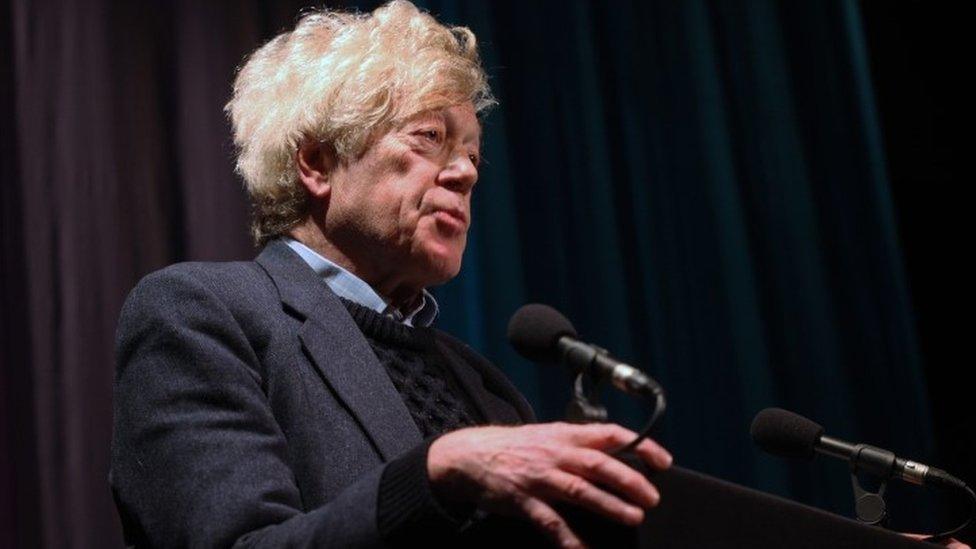Conservative thinkers being 'silenced', warns Sir Roger Scruton
- Published

Prominent conservative thinkers are being "caricatured and demonised" in an attempt to silence them, Sir Roger Scruton has said.
The philosopher and author told the BBC there was a "witch-hunt" against figures on the right of politics.
Sir Roger said he and others were being accused of "thought crimes" in order to exclude them from public debates.
He was sacked from an advisory role to ministers two weeks ago following a controversial New Statesman interview.
Remarks he made to the left-leaning title about Islamophobia, China and Muslim immigration into Europe were described as "deeply offensive" by Downing Street.
He was dismissed from the unpaid role as chairman of the Building Better, Building Beautiful Commission shortly after the interview was published.
He has since accused the magazine of misrepresenting him and taking his views out of context.
Amid a growing row over the issue, the Spectator, a conservative weekly title, has published what it says is a full recording of the original interview.
'Out in the cold'
Sir Roger told BBC Radio 4's Today programme the outcry over the interview and his subsequent treatment by government was symptomatic of a growing attempt to marginalise conservative thinking on public issues.
"I am a conservative thinker, well known as such, outspoken but reasonable in my view," he said.
"And there has been throughout this country and throughout Europe, in my view, an attempt to silence the conservative voice. We get identified, caricatured and demonised and made to look like we are some kind of sinister fascist, racist kind of people.
"As soon as the Conservative Party sees one of us being demonised in this way, they rush to disassociate themselves from us."
Allow X content?
This article contains content provided by X. We ask for your permission before anything is loaded, as they may be using cookies and other technologies. You may want to read X’s cookie policy, external and privacy policy, external before accepting. To view this content choose ‘accept and continue’.
Sir Roger suggested he had been subjected to a "witch-hunt" on social media after the interview, with "all kinds of MPs saying, 'He is not one of us,' and there I am out in the cold - my only fault being trying to defend them".
"This business of constantly manufacturing thought crimes is part of the way that is being used to silence people who are conservative, "Sir Roger said.
"OK, the Conservative Party wants to run away from those people but in doing so, it is running away from its own voters."
'Pro-Muslim'
He defended his comments about China - in which he said the regime was "creating robots out of their own people by so constraining what can be done so each Chinese person is a kind of replica of the next one" - saying references to the Communist Party had been "left out".
"It made it look as if I was talking about the Chinese people as they are in themselves.
"It was presented as a kind of racist slur on the Chinese people as such, when I was trying to talk about what the communist authorities are trying to do with them."
He also said remarks about Hungarian attitudes to immigration - in which he suggested many Hungarians were "particularly alarmed by the sudden invasion of huge tribes of Muslims from the Middle East" - and President Viktor Orban's response were also justified.
The writer insisted he was "pro-Muslim for the most part" and was reflecting the "perceptions" of Hungarians and their historical relationship with outside forces, not his own.
"I am telling the truth about what Orban is, the situation which he has had to deal with and the way the Hungarian people take the question of immigration."
Regrets
Asked if he thought the use of the word "tribe" was de-humanising, he said that "taken out of context, it is obviously not a very good phrase".
But he added: "There are an awful lot of my phrases that I regret…
"But that is what life is about. It is about trying to get across a point, reaching for the words and not necessarily finding the right ones. But it is only in the whole context that you can actually know what somebody means."
More broadly, he suggested the corruption of language was fuelling mistrust between the sexes and generations.
Critical thinkers on the right "don't know what we can be accused of, and we don't know how to vindicate ourselves when we are accused".
'Right to challenge'
Guardian columnist Zoe Williams told the Today programme that the New Statesman had probably been a "bit unfair" to Sir Roger in how it had characterised his views on Chinese authoritarianism and cultural conformity.
But she said his comments on levels of Muslim immigration into Hungary were a "dangerous myth" and it was irresponsible of him to "parrot" what she said was the Orban government's anti-foreigner line.
"We rely on the mainstream right to be able to distinguish between a kind of hysterical outburst and a kind of threat to democracy and humanity," she said.
"I don't think conservatives are being silenced. I don't think they should be silenced. I do think if they say things like that, they deserve to be challenged.
"If they don't like being challenged, that is for them to come to terms with."
George Eaton, the political editor of the New Statesman, has said he stands by his interview with Sir Roger and the academic was brought down by his "intemperate" language.
However, he has admitted that he truncated some of Sir Roger's remarks on Twitter and should have give more context to them.